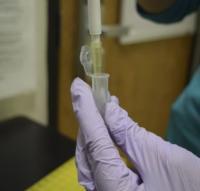The MRCF will be closed from December 22, 2025 through January 2, 2026.
If you have card access, please feel free to use the facility. Happy Holidays!
Molecular Research Core Facility
We strive to produce the highest quality data for your molecular-based research.
All About Sample Submission for DNA Services
The MRCF will accept samples at any stage in sample preparation.
We will accept whole tissue for nucleic acid extraction, PCR amplified products and researcher-prepared library constructs to run on our MiSeq.
We routinely accept already extracted and prepared DNA to be processed on our Sanger DNA sequencer.

New User and MRCF Forms
New MRCF User
If you have never submitted samples to the MRCF before, there is a one-time form that you are required to fill-out. On this form, you and your PI or Lab Director will provide contact information about your lab and samples information to ensure our staff's safety while handling your samples.
Job Request Forms
The Job Request Form is a form that contains information about the samples you are sending us - i.e. Sample names and what kind of samples we are processing. For more information on how to prepare your samples, checkout the section below "Sample Concentration and Primers."
Sample Concentrations
Input Concentrations for Sanger DNA Sequencing |
|---|
|
All samples need to be diluted in molecular grade water to a total volume of 10uL Please add 2uL of a 3.2 uM primer for a total volume of 12uL |
PCR Product Size |
Nanograms in total 10uL reaction |
|---|---|
| 100-500 | 2-10 |
| 500-1000 | 10-30 |
| 1000-1500 | 30-50 |
| Plasmid DNA | 200-400 |
Input Concentrations for Next-Generation Sequencing |
|---|
|
All samples need to be diluted in molecular grade nuclease free water in the minimum volume listed
|
NGS Applications |
Minimum concentration |
|---|---|
| 16S Amplicon Metagenomics | 5ng/uL in 20uL |
| NEBNext Ultra II | 10ng/uL in 20uL |
| NEBNext Ultra II Directional RNA | 100ng/uL in 15uL |
| TruSeq Small RNA | 200ng/uL in 10uL |
Shipping Samples
Tubes:
Samples can arrive in strip-tubes, microcentrifuge tubes or other properly sealed tubes. We ask that the tubes be wrapped in Paraffin to prevent evaporation from open lids.
Small tubes, such as PCR tubes, have arrived crushed in the mail. If you are sending small tubes, please secure them in something larger - either place them in a 50mL conical tube, or some sort of rack, to prevent damage from the shipping and handling.
Labeling:
Clearly label your samples. If samples are in strip-tubes, mark the correct orientation by placing an "A1" or "1" to show which is the first sample in the strip. If samples are in a 96-well plate, make sure the plate is marked so we know where samples are located. We typically arrange the plate in a A1-H1, ... ,A12-H12 column based orientation.
If sending primers, please clearly mark the concentration in micro-Moles (uM) on the tube. We can dilute primers to the correct concentration if we know what the concentration is for any primer sent to our lab.
Temperature:
DNA for Sanger sequencing and Fragment Analysis can be shipped at room temperature (ambient) if the samples will arrive within a day or two. If delays are expected, please pack with ice packs to prevent the samples from getting too hot. DNA libraries for NGS should be sent on ice to prevent adapter degradation.
RNA needs to be kept frozen. Overnight shipping on dry ice is preferred, however, if you are certain your samples are not contaminated with RNAses, shipping on ice is an option.
Sample Ship to address:
Idaho State University
Molecular Research Core Facility
638 E. Dunn Street MS 8007
Pocatello, ID 83209
Please email an electronic copy of your Job Request Form to mrcf@isu.edu and include a hard copy of the form along with the shipped samples.
Sample Retention Policy
Samples are stored for 1 month after the completion of a project.
Viewing and Accessing Data
Downloading Data
Once your data has been generated, the raw data files will be uploaded to BOX. You do not need to have a BOX account to access your data. We will email a link to the folder containing your files once the data has been finalized.
Viewing Data
There are freeware software packages that can be downloaded for data viewing:
- Sequence Scanner for Sanger Sequencing data files
- Peak Scanner for Fragment Analysis data files
The MRCF also has an in-house computer with software installed to analyze sequence and fragment analysis data: Sequencher, for sequencing data and GeneMapper v5.0, for fragment analysis data. Analyzing your data sets on our in-house computer is free of charge.
Data Retention Policy
Data will only be saved for 1 year and will not be archived. Please back-up your data immediately.
Lab Information
Map | Map to MRCF
Hours of Operation | 8:00AM - 4:00PM; Excluding University closures and holidays
